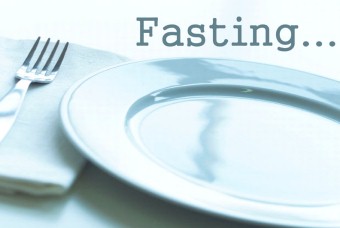0203 397 8891
Open today: 9:00am - 6:00pm

Scientists have been researching the theory that short periods of fasting could benefit our health and help with weight problems. We are constantly being fed contradicting evidence regarding what is good and bad for our health, but could this new research actually prove to be revolutionary? A BBC reporter took to investigating the idea of intermittent fasting to discover the benefits and whether it actually worked, and the results were surprising.
According to scientists, high levels of the growth hormone IGF-1 (similar to insulin) can accelerate early ageing and the premature onset of age-related diseases such as cancer and coronary heart disease. This hormone drives our cells to produce and split. However, when lower levels of it are present, our bodies work on repairing our cells rather than producing new ones; and this is what seems to be key.
When we fast, our levels of IGF-1 appear to decrease significantly, meaning our cells switch from 'growth mode' to 'repair mode'. Restricting what we eat, including less protein intake in our diet could reduce the risk of diseases and extend lif expectancy.
Two alternative theories have been put forward. The first states that you should eat healthily and follow a constant, strict calorie-controlled diet. Once every couple of months, you should respect a fasting period of three and a half days where just fifty calories and plenty of water are consumed a day, before resuming the normal restricted diet. The results appeared to be effective, but only short term unless the diet was stuck to permanently.
The other is 'Alternate Day Fasting', or ADF. This involves fasting for one day followed by what's known as a 'feed day'. On the fast day, men are still allowed to consume 600 calories or 500 calories for women; this tends to be one balanced and healthy meal a day. Studies also show that as long as you stick to the fast day, it doesn't matter what you eat on the feed day and whether it is high-fat or low-fat.


For the reporter, ADF was too impractical and difficult, whereas the 5:2 method seemed to be more manageable. As it suggests, this involves eating normally for 5 days and then restricting your calorie intake on the other two. In this particular trial, within five weeks the reporter lost a stone, reduced his body fat from 27% to 19%, and his levels of IGF-1 decreased by 50%, lowering his risk of contracting age-related health complications. The evidence certainly indicates that we could all benefit from cutting our calorie intake and increase longevity in doing so, but is it too extreme?
Of course fasting, just like eating, should be done in moderation and is not suitable for everyone. However, if you are looking to lose weight and reassess your diet, a detox holiday is a simple and effective way to improve your health and well-being before committing to a more long-term change. A tailored detox programme consists of a wholesome diet, wellness activities such as yoga and Pilates and carefully chosen treatments designed to improve your body awareness and achieve mental clarity. Plus, you will receive nutritional advice to ensure the benefits of the detox are sustained even after the programme has ended. The SHA Wellness Clinic in Spain offers an excellent detox programme where no detail is overlooked. The detox is based on a macrobiotic diet, a number of consultations with health specialists, exercise and a range of well-being treatments. After your holiday, the team at SHA continue with 2 month's communication by e-mail for follow up consultations and will provide you with a personalised post-treatment health plan.
It is important to also remember that exercising regularly is crucial if we want to age healthily. An active holiday will provide you with the renewed motivation to follow a fitness regime and lead a healthy lifestyle.
Talk to one of our Travel Specialists on 0203 397 8891 or contact us here to discuss tailor-making your perfect healthy holiday.
Join our mailing list to receive the latest news, offers & £50 off your first holiday.